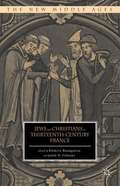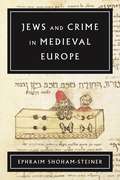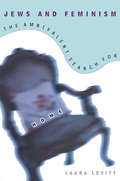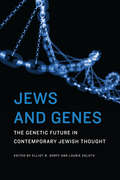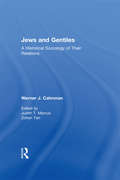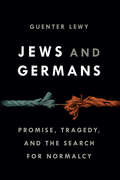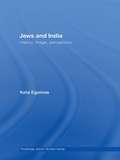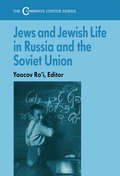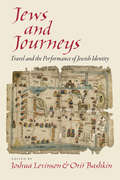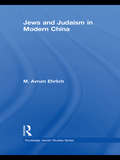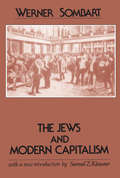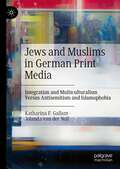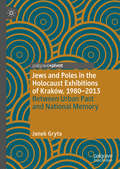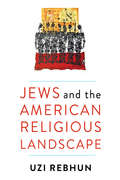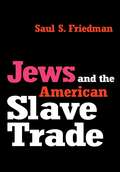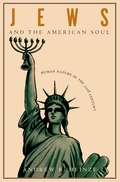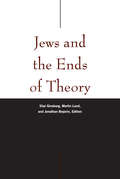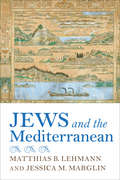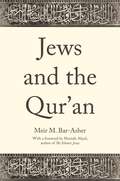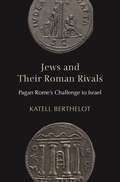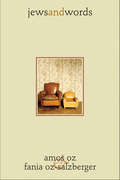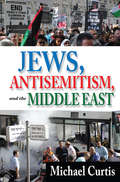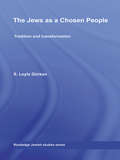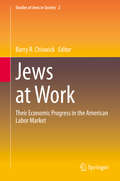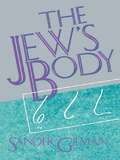- Table View
- List View
Jews and Christians in Thirteenth-Century France
by Elisheva Baumgarten Judah D. GalinskyIn light of the growing tendency to view both religious communities as intimately linked, this work seeks to examine a variety of perspectives on Jewish and Christian life in northern France during the thirteenth-century. Contributors investigate the social and cultural changes which took place in European medieval society through legal developments, religious polemic, gender, social history, perceptions of the 'other,' language, literature and art. A secondary, but no less important goal,of this collection is to break down the artificial boundaries that divide the various academic disciplines and those that separate 'medieval studies' from 'Jewish studies'.
Jews and Crime in Medieval Europe
by Ephraim Shoham-SteinerJews and Crime in Medieval Europe is a topic laced by prejudice on one hand and apologetics on the other. Beginning in the Middle Ages, Jews were often portrayed as criminals driven by greed. While these accusations were, for the most part, unfounded, in other cases criminal accusations against Jews were not altogether baseless. Drawing on a variety of legal, liturgical, literary, and archival sources, Ephraim Shoham-Steiner examines the reasons for the involvement in crime, the social profile of Jews who performed crimes, and the ways and mechanisms employed by the legal and communal body to deal with Jewish criminals and with crimes committed by Jews. A society’s attitude toward individuals identified as criminals—by others or themselves—can serve as a window into that society’s mores and provide insight into how transgressors understood themselves and society’s attitudes toward them. The book is divided into three main sections. In the first section, Shoham-Steiner examines theft and crimes of a financial nature. In the second section, he discusses physical violence and murder, most importantly among Jews but also incidents when Jews attacked others and cases in which Jews asked non-Jews to commit violence against fellow Jews. In the third section, Shoham-Steiner approaches the role of women in crime and explores the gender differences, surveying the nature of the crimes involving women both as perpetrators and as victims, as well as the reaction to their involvement in criminal activities among medieval European Jews. While the study of crime and social attitudes toward criminals is firmly established in the social sciences, the history of crime and of social attitudes toward crime and criminals is relatively new, especially in the field of medieval studies and all the more so in medieval Jewish studies. Jews and Crime in Medieval Europe blazes a new path for unearthing daily life history from extremely recalcitrant sources. The intended readership goes beyond scholars and students of medieval Jewish studies, medieval European history, and crime in pre-modern society.
Jews and Feminism: The Ambivalent Search for Home
by Laura LevittBy interrogating America's promise of a home for Jews as citizens of the liberal state, Jews and Feminism questions the very terms of this social "contract". Maintaining that Jews, women, and Jewish women are not necessarily secure within this construction of the state, Laura Levitt links this contractual construction of belonging and acceptance to legacies of marriage as a contractual home for Jewish women. Exploring the immigration of Jews from Eastern Europe for America, as well as their desire to make this country their permanent home, Levitt raises questions about the search for stability in specific Jewish religious and cultural traditions which is linked to the liberal academy as well as feminist study, thus offering an account of an ambivalent Jewish feminist embrace of America as home.
Jews and Genes: The Genetic Future in Contemporary Jewish Thought
by Rabbi Elliot N. Dorff Dr Laurie ZolothWell aware of Jews having once been the victims of Nazi eugenics policies, many Jews today have an ambivalent attitude toward new genetics and are understandably wary of genetic forms of identity and intervention. At the same time, the Jewish tradition is strongly committed to medical research designed to prevent or cure diseases. Jews and Genes explores this tension against the backdrop of various important developments in genetics and bioethics—new advances in stem cell research; genetic mapping, identity, testing, and intervention; and the role of religion and ethics in shaping public policy. Jews and Genes brings together leaders in their fields, from all walks of Judaism, to explore these most timely and intriguing topics—the intricacies of the genetic code and the wonders of life, along with cutting-edge science and the ethical issues it raises.
Jews and Gentiles: A Historical Sociology of Their Relations
by Werner J. Cahnman"Studies of the Jewish experience among peoples with whom they live share some similarities with the usual histories of anti-Semitism, but also some differences. When the focus is on anti-Semitism, Jewish history appears as a record of unmitigated hostility against the Jewish people and of passivity on their part. However, as Werner J. Cahnman demonstrates in this posthumous volume, Jewish-Gentile relations are far more complex. There is a long history of mutual contacts, positive as well as antagonistic, even if conflict continues to require particular attention.Cahnman's approach, while following a historical sequence, is sociological in conception. From Roman antiquity through the Middle Ages, into the era of emancipation and the Holocaust, and finally to the present American and Israeli scene, there are basic similarities and various dissimilarities, all of which are described and analyzed. Cahnman tests the theses of classical sociology implicitly, yet unobtrusively. He traces the socio-economic basis of human relations, which Marx and others have emphasized, and considers Jews a ""marginal trading people"" in the Park-Becker sense. Simmel and Toennies, he shows, understood Jews as ""strangers"" and ""intermediaries."" While Cahnman shows that Jews were not ""pariahs,"" as Max Weber thought, he finds a remarkable affinity to Weber's Protestantism-capitalism argument in the tension of Jewish-Christian relations emerging from the bitter theological argument over usury.The primacy of Jewish-Gentile relations in all their complexity and variability is essential for the understanding of Jewish social and political history. This volume is a valuable contribution to that understanding."
Jews and Germans: Promise, Tragedy, and the Search for Normalcy
by Guenter LewyJews and Germans is the only book in English to delve fully into the history and challenges of the German-Jewish relationship, from before the Holocaust to the present day. The Weimar Republic era—the fifteen years between Germany&’s defeat in World War I (1918) and Hitler&’s accession (1933)—has been characterized as a time of unparalleled German-Jewish concord and collaboration. Even though Jews constituted less than 1 percent of the German population, they occupied a significant place in German literature, music, theater, journalism, science, and many other fields. Was that German-Jewish relationship truly reciprocal? How has it evolved since the Holocaust, and what can it become? Beginning with the German Jews&’ struggle for emancipation, Guenter Lewy describes Jewish life during the heyday of the Weimar Republic, particularly the Jewish writers, left-wing intellectuals, combat veterans, and adult and youth organizations. With this history as a backdrop he examines the deeply disparate responses among Jews when the Nazis assumed power. Lewy then elucidates Jewish life in postwar West Germany; in East Germany, where Jewish communists searched for a second German-Jewish symbiosis based on Marxist principles; and finally in the united Germany—illuminating the complexities of fraught relationships over time.
Jews and India: Perceptions and Image (Routledge Jewish Studies Series)
by Yulia EgorovaExploring the image of Jews in India in the nineteenth and twentieth centuries, this book looks at both the Indian attitudes towards the Jewish communities of the subcontinent and at the way Jews and Judaism in general have been represented in Indian discourse. Despite the fact that the Indian Jewish population constitutes one of the country’s tiniest minorities, the relations of the local Jews with other communities form an integral part in the history of Indian multiculturalism. This has become increasingly apparent over the last two centuries as Judaism and its image have been incorporated into the discussions of some of the most prominent figures of different religious and nationalist movements, leaders of independent India, and the Indian mass media. Furthermore, recent decades witnessed mass adoption of Israelite identity by Indians from two different regions and religious groups. Being a topic that has received little attention, Jews and India seeks to rectify this situation by examining these developments and providing a fascinating insight into these issues. This volume will be of interest to scholars of Jewish and Indian cultural studies.
Jews and Jewish Life in Russia and the Soviet Union
by Yaacov Ro'IThe main focus of this book is Jewish life under the Soviet regime. The themes of the book include: the attitude of the government to Jews, the fate of the Jewish religion and life in Post-World War II Russia. The volume also contains an assessment of the prospects for future emigration.
Jews and Journeys: Travel and the Performance of Jewish Identity (Jewish Culture and Contexts)
by Joshua Levinson and Orit BashkinJourneys of dislocation and return, of discovery and conquest hold a prominent place in the imagination of many cultures. Wherever an individual or community may be located, it would seem, there is always the dream of being elsewhere. This has been especially true throughout the ages for Jews, for whom the promises and perils of travel have influenced both their own sense of self and their identity in the eyes of others.How does travel writing, as a genre, produce representations of the world of others, against which one's own self can be invented or explored? And what happens when Jewish authors in particular—whether by force or of their own free will, whether in reality or in the imagination—travel from one place to another? How has travel figured in the formation of Jewish identity, and what cultural and ideological work is performed by texts that document or figure specifically Jewish travel? Featuring essays on topics that range from Abraham as a traveler in biblical narrative to the guest book entries at contemporary Israeli museum and memorial sites; from the marvels medieval travelers claim to have encountered to eighteenth-century Jewish critiques of Orientalism; from the Wandering Jew of legend to one mid-twentieth-century Yiddish writer's accounts of his travels through Peru, Jews and Journeys explores what it is about travel writing that enables it to become one of the central mechanisms for exploring the realities and fictions of individual and collective identity.
Jews and Judaism in Modern China (Routledge Jewish Studies Series)
by M. Avrum EhrlichJews and Judaism in Modern China explores and compares the dynamics at work in two of the oldest, intact and starkly contrasting civilizations on earth; Jewish and Chinese. The book studies how they interact in modernity and how each civilization views the other, and analyses areas of cooperation between scholars, activists and politicians. Through evaluation of the respective talents, qualities and social assets that are fused and borrowed in the civilizational exchange, we gain an insight into the social processes underpinning two contrasting and long surviving civilizations. Identifying and analysing some of the emerging current issues, this book suggests Jewish-Chinese relations may become a growing discipline of import to the study of religion and comparative identity, and looks at how the significant contrasts in Jewish and Chinese national constructs may serve them well in the quest for a meaningful discourse. Chapters explore identity, integrity of the family unit; minority status; religious freedom; ethics and morality; tradition versus modernity; the environment, and other areas which are undergoing profound transformation. Identifying the intellectual and practical nexus and bifurcation between the two cultures, worldviews and identities, this work is indispensable for students of Chinese studies, sociology, religion and the Jewish diaspora, and provides useful reading for Western tourists to China.
The Jews and Modern Capitalism
by Werner SombartSince its first appearance in Germany in 1911, Jews and Modern Capitalism has provoked vehement criticism. As Samuel Z. Klausner emphasizes, the lasting value of Sombart's work rests not in his results-most of which have long since been disproved-but in his point of departure. Openly acknowledging his debt to Max Weber, Sombart set out to prove the double thesis of the Jewish foundation of capitalism and the capitalist foundation of Judaism. Klausner, placing Sombart's work in its historical and societal context, examines the weaknesses and strengths of Jews and Modern Capitalism.
Jews and Muslims in German Print Media: Integration and Multiculturalism Versus Antisemitism and Islamophobia
by Jolanda van der Noll Katharina F. GallantThis book uses a comparative research design to analyze the reporting on the Jewish minority and the Muslim minority in German newspapers from 2010-2019, asking whether minorities are truly treated as equals in the reporting of the mainstream German media. After providing historical and socio-political context for both groups as minority populations in Germany, the authors make use of qualitative and quantitative methods to examine sentiment and determine whether the media demonstrates a unifying or a well-differentiated portrayal of the two groups. The findings show that reporting on these groups is not as unbiased as many in Germany believe. Drawing on frameworks including the needs-based model of reconciliation, the revised integrated threat theory, and the model of acculturation strategies, the book then discusses the implications for both journalistic reporting and broader social policies in support of a constructive encounter of dominant andnon-dominant groups in a diverse society. This book will be of interest to scholars and students in the field of migration, integration and intergroup relations, as well as those in communication, media studies, and discourse analysis.
Jews and Poles in the Holocaust Exhibitions of Kraków, 1980–2013: Between Urban Past and National Memory
by Janek GrytaThis book offers a unique approach to memory studies by focusing on local memory work conducted across the divide of the fall of Communism, whereas other histories have consistently used 1989 as a watershed moment. By examining the ways in which the Holocaust has been exhibited in Kraków, it investigates the impact local memory work has had on Polish collective memory and problematizes the importance of the fall of Communism for memory work. Using the Polish case study, it contributes to international debates on the nature of urban memory. It brings to the fore the role of mid-ranking governmental and municipal activists for local remembrance, investigates the relationship between the form and the content of the exhibitions, and highlights the importance of authenticity and emotional evocations for Holocaust remembrance. In particular, it focuses on the emergence of cosmopolitan memory of the Holocaust, a process with local, Kraków, sources.
Jews and the American Religious Landscape: A Comparative Study
by Uzi RebhunJews and the American Religious Landscape explores major complementary facets of American Judaism and Jewish life through a comprehensive analysis of contemporary demographic and sociological data. Focusing on the most important aspects of social development—geographic location, socioeconomic stratification, family dynamics, group identification, and political orientation—the volume adds empirical value to questions concerning the strengths of Jews as a religious and cultural group in America and the strategies they have developed to integrate successfully into a Christian society.With advanced analyses of data gathered by the Pew Research Center, Jews and the American Religious Landscape shows that Jews, like other religious and ethnic minorities, strongly identify with their religion and culture. Yet their particular religiosity, along with such factors as population dispersion, professional networks, and education, have created different outcomes in various contexts. Living under the influence of a Christian majority and a liberal political system has also cultivated a distinct ethos of solidarity and egalitarianism, enabling Judaism to absorb new patterns in ways that mirror its integration into American life. Rich in information thoughtfully construed, this book presents a remarkable portrait of what it means to be an American Jew today.
Jews and the American Slave Trade
by Saul FriedmanThe Nation of Islam's Secret Relationship between Blacks and Jews has been called one of the most serious anti-Semitic manuscripts published in years. This work of so-called scholars received great celebrity from individuals like Louis Farrakhan, Leonard Jeffries, and Khalid Abdul Muhammed who used the document to claim that Jews dominated both transatlantic and antebellum South slave trades. As Saul Friedman definitively documents in Jews and the American Slave Trade, historical evidence suggests that Jews played a minimal role in the transatlantic, South American, Caribbean, and antebellum slave trades.Jews and the American Slave Trade dissects the questionable historical technique employed in Secret Relationship, offers a detailed response to Farrakhan's charges, and analyzes the impetus behind these charges. He begins with in-depth discussion of the attitudes of ancient peoples, Africans, Arabs, and Jews toward slavery and explores the Jewish role hi colonial European economic life from the Age of Discovery tp Napoleon. His state-by-state analyses describe in detail the institution of slavery in North America from colonial New England to Louisiana. Friedman elucidates the role of American Jews toward the great nineteenth-century moral debate, the positions they took, and explains what shattered the alliance between these two vulnerable minority groups in America.Rooted in incontrovertible historical evidence, provocative without being incendiary, Jews and the American Slave Trade demonstrates that the anti-slavery tradition rooted in the Old Testament translated into powerful prohibitions with respect to any involvement in the slave trade. This brilliant exploration will be of interest to scholars of modern Jewish history, African-American studies, American Jewish history, U.S. history, and minority studies.
Jews and the American Soul: Human Nature in the Twentieth Century
by Andrew R. HeinzeWhat do Joyce Brothers and Sigmund Freud, Rabbi Harold Kushner and philosopher Martin Buber have in common? They belong to a group of pivotal and highly influential Jewish thinkers who altered the face of modern America in ways few people recognize. So argues Andrew Heinze, who reveals in rich and unprecedented detail the extent to which Jewish values, often in tense interaction with an established Christian consensus, shaped the country's psychological and spiritual vocabulary. Jews and the American Soul is the first book to recognize the central role Jews and Jewish values have played in shaping American ideas of the inner life. It overturns the widely shared assumption that modern ideas of human nature derived simply from the nation's Protestant heritage. Heinze marshals a rich array of evidence to show how individuals ranging from Erich Fromm to Ann Landers changed the way Americans think about mind and soul. The book shows us the many ways that Jewish thinkers influenced everything from the human potential movement and pop psychology to secular spirituality. It also provides fascinating new interpretations of Sigmund Freud, Alfred Adler, and Western views of the psyche; the clash among Protestant, Catholic, and Jewish moral sensibilities in America; the origins and evolution of America's psychological and therapeutic culture; the role of Jewish women as American public moralists, and more. A must-read for anyone interested in the contribution of Jews and Jewish culture to modern America.
Jews and the Ends of Theory
by Shai Ginsburg Martin Land Jonathan Boyarin Svetlana Boym Sergey Dolgopolski Jay Geller Sarah Hammerschlag Martin Jay Elliot R. Wolfson Andrew Bush Hannan Hever James I. Porter Yehouda ShenhavTheory has often been coded as “Jewish”—not merely because Jewish intellectuals have been central participants, but also, this book argues, because certain problematics of modern Jewishness enrich theoretical questions across the humanities. In the range of violence and agency that can attend the appellation “Jew,” Jewishness is revealed as a rhetorical and not just social fact, one tied to profound questions of power, subjectivity, identity, figuration, language, and relation that are also central to modern theory and modern politics. Understanding Jewishness in its fluidity, this book helps articulate theory’s potential to mediate pessimistic and utopian impulses, experiences, and realities.
Jews and the Mediterranean (Sephardi And Mizrahi Studies)
by Matthias B. Lehmann Jessica M. MarglinA selection of essays examining the significance of what Jewish history and Mediterranean studies contribute to our knowledge of the other.Jews and the Mediterranean considers the historical potency and uniqueness of what happens when Sephardi, Mizrahi, and Ashkenazi Jews meet in the Mediterranean region. By focusing on the specificity of the Jewish experience, the essays gathered in this volume emphasize human agency and culture over the length of Mediterranean history. This collection draws attention to what made Jewish people distinctive and warns against facile notions of Mediterranean connectivity, diversity, fluidity, and hybridity, presenting a new assessment of the Jewish experience in the Mediterranean.
Jews and the Qur'an
by Meir M. Bar-AsherA compelling book that casts the Qur’anic encounter with Jews in an entirely new lightIn this panoramic and multifaceted book, Meir Bar-Asher examines how Jews and Judaism are depicted in the Qur’an and later Islamic literature, providing needed context to those passages critical of Jews that are most often invoked to divide Muslims and Jews or to promote Islamophobia. He traces the Qur’anic origins of the protection of Jews and other minorities living under the rule of Islam, and shows how attitudes toward Jews in Shi‘i Islam are substantially different from those in Sunni Islam. Bar-Asher sheds light on the extraordinary contribution of Jewish tradition to the Muslim exegesis of the Qur’an, and draws important parallels between Jewish religious law, or halakha, and shari‘a law.An illuminating work on a topic of vital relevance today, Jews and the Qur’an offers a nuanced understanding of Islam’s engagement with Judaism in the time of Muhammad and his followers, and serves as a needed corrective to common misperceptions about Islam.
Jews and Their Roman Rivals: Pagan Rome's Challenge to Israel
by Katell BerthelotHow encounters with the Roman Empire compelled the Jews of antiquity to rethink their conceptions of Israel and the TorahThroughout their history, Jews have lived under a succession of imperial powers, from Assyria and Babylonia to Persia and the Hellenistic kingdoms. Jews and Their Roman Rivals shows how the Roman Empire posed a unique challenge to Jewish thinkers such as Philo, Josephus, and the Palestinian rabbis, who both resisted and internalized Roman standards and imperial ideology.Katell Berthelot traces how, long before the empire became Christian, Jews came to perceive Israel and Rome as rivals competing for supremacy. Both considered their laws to be the most perfect ever written, and both believed they were a most pious people who had been entrusted with a divine mission to bring order and peace to the world. Berthelot argues that the rabbinic identification of Rome with Esau, Israel's twin brother, reflected this sense of rivalry. She discusses how this challenge transformed ancient Jewish ideas about military power and the use of force, law and jurisdiction, and membership in the people of Israel. Berthelot argues that Jewish thinkers imitated the Romans in some cases and proposed competing models in others.Shedding new light on Jewish thought in antiquity, Jews and Their Roman Rivals reveals how Jewish encounters with pagan Rome gave rise to crucial evolutions in the ways Jews conceptualized the Torah and conversion to Judaism.
Jews and Words
by Fania Oz-Salzberger Amos OzWhy are words so important to so many Jews? Novelist Amos Oz and historian Fania Oz-Salzberger roam the gamut of Jewish history to explain the integral relationship of Jews and words. Through a blend of storytelling and scholarship, conversation and argument, father and daughter tell the tales behind Judaism's most enduring names, adages, disputes, texts, and quips. These words, they argue, compose the chain connecting Abraham with the Jews of every subsequent generation.Framing the discussion within such topics as continuity, women, timelessness, and individualism, Oz and Oz-Salzberger deftly engage Jewish personalities across the ages, from the unnamed, possibly female author of the Song of Songs through obscure Talmudists to contemporary writers. They suggest that Jewish continuity, even Jewish uniqueness, depends not on central places, monuments, heroic personalities, or rituals but rather on written words and an ongoing debate between the generations. Full of learning, lyricism, and humor, Jews and Words offers an extraordinary tour of the words at the heart of Jewish culture and extends a hand to the reader, any reader, to join the conversation.
Jews, Antisemitism, and the Middle East
by Michael CurtisWill animosity towards Jews and the State of Israel never end? This book ventures to rectify the misrepresentations, propaganda, obsessions, and falsifications widely disseminated in the media and public discourse, explaining the motivations behind them. The issues Michael Curtis scrutinizes are complicated and controversial, sometimes even baffling, but he reviews them in as objective and rigorous a manner as possible. Curtis divides his arguments into five key areas: political correctness and the obsessive attack on Israel; the surprising and disturbing rise of antisemitism; the Arab world and the Islamist threat; the Palestinian narrative; and the Israeli/Palestinian conflict. The first section focuses on the censorious attitude toward Israel taken by many in the international community. A second section consists of essays on the increase of contemporary antisemitism in Arab and Muslim countries as well as European democracies. In the third section, the author addresses changes in the Arab world, the threat of Iranian ambitions, the new alliance of Sunni Islamist states, and the growing strength and danger of Islamic fundamentalism and extremist behavior. His fourth section, on the Palestinian Narrative, details the acceptance by many critics of Israel and the international media of the Palestinian narrative of victimhood. Finally, the section on the Israeli-Palestinian conflict details the continuing struggle within the Middle East between Israelis and Palestinians. This book is a must read for historians, political scientists, Jewish studies scholars, and all those interested in one of the most volatile and controversial regions in the world today.
The Jews as a Chosen People: Tradition and transformation (Routledge Jewish Studies Series)
by S. Leyla GurkanThe concept of the Jews as a chosen people is a key element of the Jewish faith and identity. This book explores the idea of chosenness from the ancient world, through modernity and into the Post-Holocaust era. Analysing a vast corpus of biblical, ancient, rabbinic and modern Jewish literature, the author seeks to give a better understanding of this central doctrine of the Jewish religion. She shows that although the idea of chosenness has been central to Judaism and Jewish self-definition, it has not been carried to the present day in the same form. Instead it has gone through constant change, depending on who is employing it, against what sort of background, and for what purpose. Surveying the different and sometimes conflicting interpretations of the doctrine of chosenness that appear in Ancient, Modern, and Post-Holocaust periods, the dominant themes of ‘Holiness’, ‘Mission’, and ‘Survival’ are identified in each respective period. The theological, philosophical, and sociological dimensions of the question of Jewish chosenness are thus examined in their historical context, as responses to the challenges of Christianity, Modernity, and the Holocaust in particular. This book will be of interest to scholars and students of Jewish Studies, the Holocaust, religion and theology.
Jews at Work: Their Economic Progress in the American Labor Market (Studies of Jews in Society #2)
by Barry R. ChiswickThis book addresses the educational, occupational, and income progress of Jews in the American labor market. Using theoretical and statistical findings, it compares the experience of American Jews with that of other Americans, from the middle of the 19th century through the 20th and into the early 21st century.Jews in the United States have been remarkably successful; from peddlers and low-skilled factory workers, clearly near the bottom of the economic ladder, they have, as a community, risen to the top of the economic ladder. The papers included in this volume, all authored or co-authored by Barry Chiswick, address such issues as the English language proficiency, occupational attainment and earnings of Jews, educational and labor market discrimination against Jews, life cycle and labor force participation patterns of Jewish women, and historical and methodological issues, among many others. The final chapter analyzes alternative explanations for the consistently high level of educational and economic achievement of American Jewry over the past century and a half. The chapters in this book also develop and demonstrate the usefulness of alternative techniques for identifying Jews in US Census and survey data where neither religion nor Jewish ethnicity is explicitly identified. This methodology is also applicable to the study of other minority groups in the US and in other countries.
The Jew's Body
by Sander GilmanDrawing on a wealth of medical and historical materials, Sander Gilman sketches details of the anti-Semitic rhetoric about the Jewish body and mind, including medical and popular depictions of the Jewish voice, feet, and nose. Case studies illustrate how Jews have responded to such public misconceptions as the myth of the cloven foot and Jewish flat-footedness, the proposed link between the Jewish mind and hysteria, and the Victorians' irrational connection between Jews and prostitutes. Gilman is especially concerned with the role of psychoanalysis in the construction of anti-Semitism, examining Freud's attitude towards his own Jewishness and its effect on his theories, as well as the supposed "objectiveness" of psychiatrists and social scientists.
